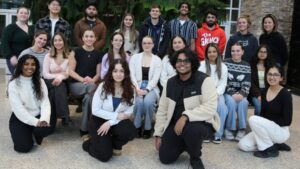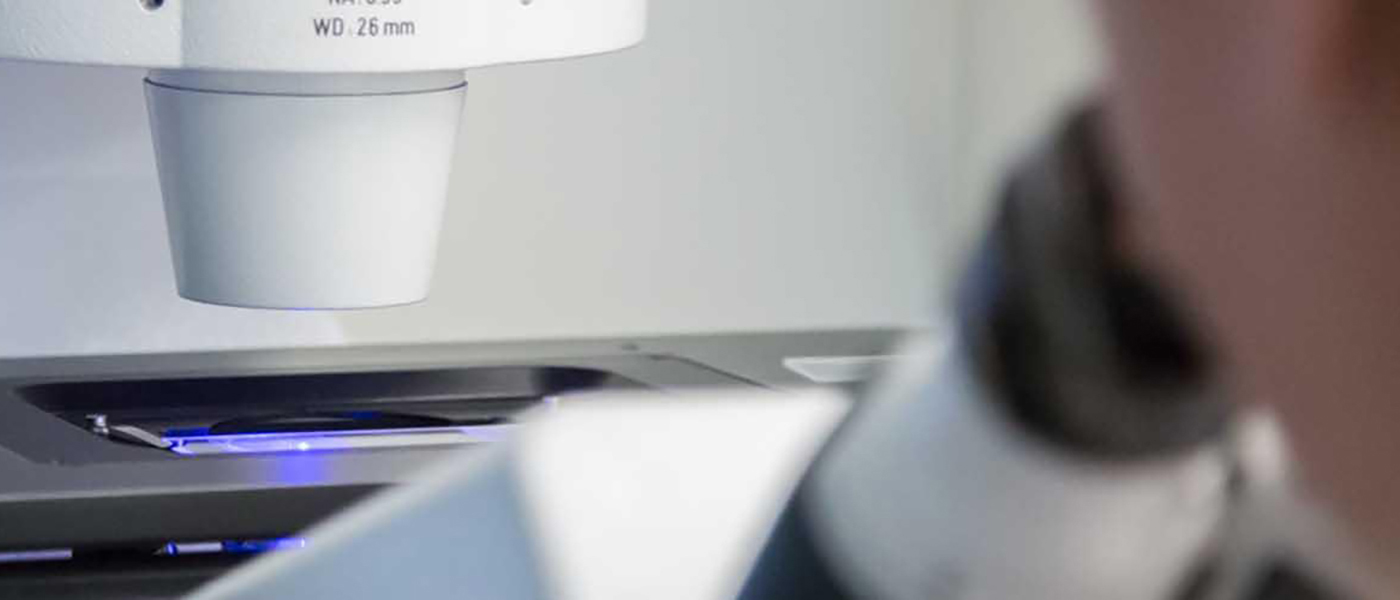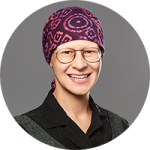Life Sciences
Life Sciences research at McMaster encompasses the use of interdisciplinary approaches to study the biology, chemistry and behaviour of life. These include:
- understanding the chemical interactions within cells and how these cells interact with each other to form tissues and organ systems
- investigating the neural and autonomous regulation of our bodily processes
- integrating our studies with elements of human behaviour and environmental factors that can influence these processes.
Using model organisms and advanced scientific techniques, life sciences research can evaluate the critical pathogenic trends that emerge during our interactions with the environment. We are also better able to appreciate the pathophysiological consequences of disease to attain a more holistic perspective on human health and well-being.
Information Box Group
Ana Campos
Director, School of Interdisciplinary Science
Summary:
Director, Professor
Associate Member, Department of Biology
Genetic and molecular analysis of visual system development in Drosophila melanogaster.
Research Interests:
Hydra, Regeneration, Drosophila, Developmental Biology, Cell Biology, Genetics
The ability to generate genetic variants has greatly aided the study of biochemical and developmental pathways. Given the success of this approach it is not surprising that genetics is being used to address a wide range of neurobiological questions including the generation of behaviour. My laboratory uses the larval visual system of the fruit fly Drosophila melanogaster as a model system to investigate the mechanisms underlying the development and function of the nervous system. To that end, mutations or molecular tools are used to impair specific cell types and/or cellular interactions. Mutations found to disrupt the development of the larval visual system or the larval response to light can be used to identify molecules involved in these processes. Thus, my research program can be divided in two parts namely the genetic analysis of the larval response to light and the molecular genetic analysis of genes required for the development of the larval visual system. To address these questions a variety of techniques are used such as mutant analysis, molecular and cell biology.
Kimberley Dej
Associate Professor
Summary:
Associate Professor
Associate Member, Biology
Dr. Kim Dej completed her undergraduate at the University of Toronto (St. George) in the Molecular Genetics program with a Major in Zoology and a Minor in Botany. During this time she developed an interest in genetics, chromosome structure, and transposable elements. She completed her PhD at Johns Hopkins University with Allan Spradling (Carnegie Institute of Washington) and went on to be a postdoctoral fellow at MIT with Terry Orr-Weaver (Whitehead Institute for Biomedical Research). She joined the McMaster community in 2004 where her teaching has focused on genetics, cell biology, research methods, undergraduate laboratory experiences, in addition to community engagement and science communication. Dr. Dej has taught in the Life Sciences program since 2009 and she has been a part of the evolution of the program. She has won several teaching awards including the McMaster President’s Award for Outstanding Contributions to Teaching and Learning, a McMaster Student Union Award (Science), an OCUFA Teaching Award, and a YWCA Woman of Distinction Award for Education and Mentorship.
Research Interests:
nematode biodiversity; authentic lab research and the undergraduate experience; peer-mentorship and undergraduate student engagement; digital storytelling and student learning
Dr. Dej’s lab research with undergraduate students has focused on the cell cycle in Drosophila melanogaster and biodiversity in nematode species. In 2015 Dr. Dej became a MacPherson Teaching Fellow, which has allowed her to identify and expand independent undergraduate research opportunities on campus. This has been possible by focusing on training (the interactive Nematode Diversity Project eBook lab manual), space (The Applied Learning Lab for Undergraduate Research Excellence, or ALLURE), and funding (small grants that encourage peer-learning and collaboration in undergraduate thesis research). This is part of her broader interest in providing authentic research opportunities embedded in courses for undergraduates even in large courses and assessing the role these experiences play in engaging students. These opportunities are illustrated by development of the Amylase Gene Project (with Alastair Tracey, BIOL1A03), Personal Genome Testing (with Mihaela Georgescu, MOLBIOL2C03), and the development of the Living Systems Lab in the School of Interdisicplinary Science (various student, staff, and faculty collaborators, LIFESCI2L03 & LIFESCI3L03). In 2016 to 2018, Dr. Dej was a MIIETL Leadership in Teaching and Learning (LTL) Fellow. She has used this as an opportunity to partner with students in curriculum development, including assessing the impact on student engagement and learning of cohort-building and scaffolded peer-mentorship within interdisciplinary streams in the Life Sciences program. In partnership with the McMaster Children and Youth University (MCYU) and MacPherson student partners, Dr. Dej is leading the development of ebooks for elementary and middle-school students. Within this project, research is focused upon measuring the impact of the interactive digital storytelling on the learning in addition to the impact of community-engaged learning on university students.
Courses:
CMTYENGA2A03: Foundations in Community Engagement
LIFESCI4N03 (Visualizing Science)
LIFESCI2G03: Genes, Genomes, and Society
Discovery Program (through Arts & Science program)
Chad Harvey
Associate Professor
Associate Director Integrated Science Program
Summary:
Program Coordinator, Honours Integrated Science
Dr. Chad Harvey is the instructor for the Life Science component of iSci 1A24. His educational background in the fields of invasion biology, zoology, and entomology certainly come through in his teaching style. As such, Dr. Harvey introduces a new “organism of the day” at the beginning of each lecture.
Research Interests:
Foodweb ecology, conservation biology, biostatistics, pedagogical engagement, interdisciplinary curriculum design, research-based education
Foodweb and community ecology of non-indigenous (invasive) species. My field and laboratory research attempts to determine the direct and indirect interactions and mechanisms through which non-indigenous species impact resident foodwebs and ecosystems. I employ a combination of empirical and theoretical tools to understand these interactions across multiple spatial and temporal scales. My pedagogical research seeks to increase student engagement in the entire teaching and learning process. I pursue this through identifying the importance of interdisciplinarity in teaching. Why do I need to study math if I am interested in biology? Additionally, I seek to discover techniques and strategies that increase student involvement in the classroom, enhancing student activity in the classroom and their general desire to learn and apply learning concepts. My field and laboratory research attempts to determine the direct and indirect interactions and mechanisms through which non-indigenous species impact resident foodwebs and ecosystems. I employ a combination of empirical and theoretical tools to understand these interactions across multiple spatial and temporal scales. My primary research interests deal with how populations of non-indigenous (invasive) species interact with resident species over multiple spatial and temporal scales. The main thrust of my research highlights the importance of indirect interactions as a mechanism by which non-indigenous species impact these systems. My research to date has combined these ideas with quantitative theory and empirical studies in a number of managed and natural systems. I use a number of statistical approaches, including multivariate and spatial statistics, to address both applied and fundamental questions. The ultimate goal of my research is to ascertain the key interactions by which non-indigenous species impact native ecosystems and how we may predict the outcome of these impacts for conservation purposes.
Courses:
ISCI 1A24
ISCI 2A18
ISCI 3A12
ISCI 4A12
ISCI/ARTSCI 3IE1 – KENTUCKY CAVES
ISCI/ARTSCI 3IE1 – GRANT WRITING
ISCI 3IS3

Chad Harvey
Associate Professor
Associate Director Integrated Science Program
Ayesha Khan
Associate Professor
Summary:
Associate Director (Curriculum & Pedagogy),
Joint Appointment, Psychology, Neuroscience & Behaviour
Dr. Ayesha Khan has a Ph.D. in behavioural neuroendocrinology during which she investigated the influence of in utero, dietary, and social factors on time to sexual maturity in developing females. Her research has been published in journals such as Reproduction, Physiology & Behavior, Reproduction, Fertility and Development, Hormones and Behavior, and Hormone and Metabolic Research. Her passion for teaching is largely driven by the interactions she has with the enthusiastic and inquisitive students she meets on a regular basis. She teaches a variety of courses covering topics such as animal behaviour, physiology of reproductive behaviour, and neuropsychology. Dr. Khan has taught in the Life Sciences program since 2013. Her teaching has been recognized through the McMaster Student Union Award for her work in community engaged education as well as through the McMaster President’s Award for Outstanding Contributions to Teaching and Learning.
Research Interests:
Student experience with community-engaged education; impact of institutional policies on student mental health; hormones and behaviour.
Dr. Khan’s research interests explore ways through which the undergraduate student experience is enhanced by incorporating experiential education in large enrollment courses. As part of a multi-institutional initiative, she is also investigating the impact of the newly implemented Fall Break on student mental health. She has received funding from the Forward With Integrity Initiative at McMaster University to create an online strategy to disseminate information about community-engaged education. In previous years, she has served as a Research Fellow at the Paul R. MacPherson Institute for Leadership, Innovation & Excellence in Teaching.
Courses:
LIFESCI 2D03
LIFESCI 3E03
LIFESCI 4X03
Heather O'Reilly (Johnston)
Assistant Professor
Summary:
Dr. Heather O’Reilly (Johnston) completed a PhD in Kinesiology and Health Science (Biomechanics/Ergonomics) and a Diploma in Health Psychology at York University. She also held the Ralph McGinn Postdoctoral Fellowship funded by WorkSafeBC at The Institute for Work and Health. She is an associate ergonomist through the Canadian College for the Certification of Professional Ergonomists (CCCPE), using an interdisciplinary approach towards the prevention and management of work-related injuries. Heather teaches in the Life Sciences and Integrated Science programs.
Outside of the university, you’ll find her training with community run clubs, finding stillness on the yoga mat, and playing fetch at the park with her dog!
Research Interests:
musculoskeletal disorders, work and health, ergonomics, occupational biomechanics, biopsychosocial risk factors, psychological injuries, evidence synthesis
Heather holds research collaborations as an adjunct scientist with the Institute for Work and Health (IWH) and as a researcher within the Centre for Research Expertise on Musculoskeletal Disorders (CRE-MSD). Combining ergonomics, biomechanics, and health psychology, she is passionate about an interdisciplinary approach towards the prevention and management of work-related injuries. Her research has explored clinical measurement of upper extremity injury, biopsychosocial factors of shoulder and spine function, workspace design, and evaluation of personal protective equipment in the armed forces. Her recent research explores the association between work-related musculoskeletal disorders and other work-related outcomes like psychological injuries and mental stress to improve occupational health and safety programs, policies, and practices.
Courses:
LIFESCI 4U03
ISCI2A18
ISCI4A12
Janet Pritchard
Assistant Professor
Summary:
Dr. Pritchard completed a PhD in Medical Sciences (Physiology and Pharmacology) at McMaster University and a postdoctoral fellowship in the Department of Medicine, Division of Geriatrics. The focus of her PhD and postdoc work was on the assessment of bone quality in older adults with type 2 diabetes, the assessment of frailty in clinical practice, and on the use of electronic decision support systems for the dissemination of clinical practice guidelines. Dr. Pritchard teaches in the Life Sciences and Kinesiology Programs.
Research Interests:
aging, nutrition, protein, sarcopenia, frailty, osteoporosis, type 2 diabetes, community engagement, service learning, intergenerational learning
My research interests are focused in the fields of aging sciences and the scholarship of teaching and learning. I conduct clinical research with undergraduate students to learn more about the determinants of healthy aging, and specifically, how nutrition and physical activity can promote preservation of musculoskeletal health. I am also interested in understanding the impact of community engagement projects and intergenerational learning experiences on undergraduate student learning.
Courses:
LifeSci 2N03
LIFESCI 3AA3
LifeSci 3G03
LIFESCI 3LX3
LIFESCI 3Z03
LIFESCI 4Z03

Shaiya Robinson
Assistant Professor
Summary:
Dr. Shaiya Robinson has a Ph.D. in cell and molecular biology from McMaster University. Her doctoral thesis examined the role of a transcription factor called Kaiso in intestinal epithelial homeostasis. Dr. Robinson completed her postdoctoral studies at the Hospital for Sick Children. There, she compared the effects of different Lactobacillus probiotics on key signalling pathways that govern intestinal epithelial cell differentiation. Currently, Dr. Robinson is an Assistant Professor with the School of Interdisciplinary Science where she teaches courses in the Life Science Program. Outside of teaching and research, Dr. Robinson enjoys baking, hiking, and horror movies.
Research Interests:
intestinal homeostasis; developmental biology; cell signalling; cell & molecular biology; genetics; peer-mentorship; virtual learning and student engagement
Courses:
LIFESCI 2G03; LIFESCI 2CC3; LIFESCI 3XX3; LIFESCI 4DD3
Sarah Symons
Professor
Summary:
Associate Member, Department of Physics & Astronomy
Dr. Sarah Symons is a Full Professor in the School of Interdisciplinary Science and an associate member of the Department of Physics & Astronomy. She was educated in the UK, gaining a BSc Honours Degree in Mathematics and Astronomy and PhD in History of Astronomy in the Department of Mathematics and Computer Science, University of Leicester. She began her career as an academic pedagogical project manager in the UK. At McMaster, she has been a pedagogical designer and teaching professor in the Honours Integrated Science Program and also teaches LIFESCI 4P03 Ancient Scientific Literature.
Research Interests:
pedagogy, history of science, history of astronomy, Egyptology, science literacy
Sarah’s involvement in scholarship of teaching and learning includes pedagogical research in science education, educational consultancy focusing on active learning and assessment design, and collaborative projects with teaching-stream and interdisciplinary faculty internationally. She is particularly interested in science literacy and scientific skills development in science courses big and small. Her research outside pedagogy is in history of astronomy, concentrating on astronomical texts and instruments from ancient Egypt.
Courses:
ISCI 1A24A/B, ISCI 2A18A/B, ISCI 3A12A/B, ISCI 4A124A, LIFESCI 4P03
Ana Tomljenovic-Berube
Assistant Professor
Summary:
Dr. Ana Tomljenovic-Berube is a proud alumna of McMaster University, having completed both her Honours B.Sc. (Co-op) and Ph.D. in the Department of Biochemistry and Biomedical Sciences. Her research focused on microbial pathogenesis and gene regulation in the pathogen Salmonella Typhimurium. Her experiences working with students as a TA in combination with her love of learning inspired her to pursue a career in teaching. After completing her graduate studies, Dr. Tomljenovic-Berube taught in the Biotechnology stream of the Bachelor of Technology Program for the School of Engineering Practice and Technology at McMaster, before joining the teaching team in the School of Interdisciplinary Science as an Assistant Professor in July 2019.
Research Interests:
Student engagement, experiential learning, student experience in their degree program, infectious diseases, gene regulation
Dr. Tomljenovic-Berube’s current pedagogical research interests revolve around student engagement and pertain to how technology, experiential laboratory learning, and other innovative active learning strategies can be used to engage STEM students to achieve deep learning and improve learning outcomes.
Courses:
LIFESCI 2G03
LIFESCI 2L03
LIFESCI 3YY3
LIFESCI 3L03
LIFESCI 4L03
ISCI 2A18 (Drug Discovery)
SCICOMM 2M03
Ana Campos
Director, School of Interdisciplinary Science
Summary:
Director, Professor
Associate Member, Department of Biology
Genetic and molecular analysis of visual system development in Drosophila melanogaster.
Research Interests:
Hydra, Regeneration, Drosophila, Developmental Biology, Cell Biology, Genetics
The ability to generate genetic variants has greatly aided the study of biochemical and developmental pathways. Given the success of this approach it is not surprising that genetics is being used to address a wide range of neurobiological questions including the generation of behaviour. My laboratory uses the larval visual system of the fruit fly Drosophila melanogaster as a model system to investigate the mechanisms underlying the development and function of the nervous system. To that end, mutations or molecular tools are used to impair specific cell types and/or cellular interactions. Mutations found to disrupt the development of the larval visual system or the larval response to light can be used to identify molecules involved in these processes. Thus, my research program can be divided in two parts namely the genetic analysis of the larval response to light and the molecular genetic analysis of genes required for the development of the larval visual system. To address these questions a variety of techniques are used such as mutant analysis, molecular and cell biology.
Ana Campos
Director, School of Interdisciplinary Science
Summary:
Director, Professor
Associate Member, Department of Biology
Genetic and molecular analysis of visual system development in Drosophila melanogaster.
Research Interests:
Hydra, Regeneration, Drosophila, Developmental Biology, Cell Biology, Genetics
The ability to generate genetic variants has greatly aided the study of biochemical and developmental pathways. Given the success of this approach it is not surprising that genetics is being used to address a wide range of neurobiological questions including the generation of behaviour. My laboratory uses the larval visual system of the fruit fly Drosophila melanogaster as a model system to investigate the mechanisms underlying the development and function of the nervous system. To that end, mutations or molecular tools are used to impair specific cell types and/or cellular interactions. Mutations found to disrupt the development of the larval visual system or the larval response to light can be used to identify molecules involved in these processes. Thus, my research program can be divided in two parts namely the genetic analysis of the larval response to light and the molecular genetic analysis of genes required for the development of the larval visual system. To address these questions a variety of techniques are used such as mutant analysis, molecular and cell biology.
Kimberley Dej
Associate Professor
Summary:
Associate Professor
Associate Member, Biology
Dr. Kim Dej completed her undergraduate at the University of Toronto (St. George) in the Molecular Genetics program with a Major in Zoology and a Minor in Botany. During this time she developed an interest in genetics, chromosome structure, and transposable elements. She completed her PhD at Johns Hopkins University with Allan Spradling (Carnegie Institute of Washington) and went on to be a postdoctoral fellow at MIT with Terry Orr-Weaver (Whitehead Institute for Biomedical Research). She joined the McMaster community in 2004 where her teaching has focused on genetics, cell biology, research methods, undergraduate laboratory experiences, in addition to community engagement and science communication. Dr. Dej has taught in the Life Sciences program since 2009 and she has been a part of the evolution of the program. She has won several teaching awards including the McMaster President’s Award for Outstanding Contributions to Teaching and Learning, a McMaster Student Union Award (Science), an OCUFA Teaching Award, and a YWCA Woman of Distinction Award for Education and Mentorship.
Research Interests:
nematode biodiversity; authentic lab research and the undergraduate experience; peer-mentorship and undergraduate student engagement; digital storytelling and student learning
Dr. Dej’s lab research with undergraduate students has focused on the cell cycle in Drosophila melanogaster and biodiversity in nematode species. In 2015 Dr. Dej became a MacPherson Teaching Fellow, which has allowed her to identify and expand independent undergraduate research opportunities on campus. This has been possible by focusing on training (the interactive Nematode Diversity Project eBook lab manual), space (The Applied Learning Lab for Undergraduate Research Excellence, or ALLURE), and funding (small grants that encourage peer-learning and collaboration in undergraduate thesis research). This is part of her broader interest in providing authentic research opportunities embedded in courses for undergraduates even in large courses and assessing the role these experiences play in engaging students. These opportunities are illustrated by development of the Amylase Gene Project (with Alastair Tracey, BIOL1A03), Personal Genome Testing (with Mihaela Georgescu, MOLBIOL2C03), and the development of the Living Systems Lab in the School of Interdisicplinary Science (various student, staff, and faculty collaborators, LIFESCI2L03 & LIFESCI3L03). In 2016 to 2018, Dr. Dej was a MIIETL Leadership in Teaching and Learning (LTL) Fellow. She has used this as an opportunity to partner with students in curriculum development, including assessing the impact on student engagement and learning of cohort-building and scaffolded peer-mentorship within interdisciplinary streams in the Life Sciences program. In partnership with the McMaster Children and Youth University (MCYU) and MacPherson student partners, Dr. Dej is leading the development of ebooks for elementary and middle-school students. Within this project, research is focused upon measuring the impact of the interactive digital storytelling on the learning in addition to the impact of community-engaged learning on university students.
Courses:
CMTYENGA2A03: Foundations in Community Engagement
LIFESCI4N03 (Visualizing Science)
LIFESCI2G03: Genes, Genomes, and Society
Discovery Program (through Arts & Science program)
Kimberley Dej
Associate Professor
Summary:
Associate Professor
Associate Member, Biology
Dr. Kim Dej completed her undergraduate at the University of Toronto (St. George) in the Molecular Genetics program with a Major in Zoology and a Minor in Botany. During this time she developed an interest in genetics, chromosome structure, and transposable elements. She completed her PhD at Johns Hopkins University with Allan Spradling (Carnegie Institute of Washington) and went on to be a postdoctoral fellow at MIT with Terry Orr-Weaver (Whitehead Institute for Biomedical Research). She joined the McMaster community in 2004 where her teaching has focused on genetics, cell biology, research methods, undergraduate laboratory experiences, in addition to community engagement and science communication. Dr. Dej has taught in the Life Sciences program since 2009 and she has been a part of the evolution of the program. She has won several teaching awards including the McMaster President’s Award for Outstanding Contributions to Teaching and Learning, a McMaster Student Union Award (Science), an OCUFA Teaching Award, and a YWCA Woman of Distinction Award for Education and Mentorship.
Research Interests:
nematode biodiversity; authentic lab research and the undergraduate experience; peer-mentorship and undergraduate student engagement; digital storytelling and student learning
Dr. Dej’s lab research with undergraduate students has focused on the cell cycle in Drosophila melanogaster and biodiversity in nematode species. In 2015 Dr. Dej became a MacPherson Teaching Fellow, which has allowed her to identify and expand independent undergraduate research opportunities on campus. This has been possible by focusing on training (the interactive Nematode Diversity Project eBook lab manual), space (The Applied Learning Lab for Undergraduate Research Excellence, or ALLURE), and funding (small grants that encourage peer-learning and collaboration in undergraduate thesis research). This is part of her broader interest in providing authentic research opportunities embedded in courses for undergraduates even in large courses and assessing the role these experiences play in engaging students. These opportunities are illustrated by development of the Amylase Gene Project (with Alastair Tracey, BIOL1A03), Personal Genome Testing (with Mihaela Georgescu, MOLBIOL2C03), and the development of the Living Systems Lab in the School of Interdisicplinary Science (various student, staff, and faculty collaborators, LIFESCI2L03 & LIFESCI3L03). In 2016 to 2018, Dr. Dej was a MIIETL Leadership in Teaching and Learning (LTL) Fellow. She has used this as an opportunity to partner with students in curriculum development, including assessing the impact on student engagement and learning of cohort-building and scaffolded peer-mentorship within interdisciplinary streams in the Life Sciences program. In partnership with the McMaster Children and Youth University (MCYU) and MacPherson student partners, Dr. Dej is leading the development of ebooks for elementary and middle-school students. Within this project, research is focused upon measuring the impact of the interactive digital storytelling on the learning in addition to the impact of community-engaged learning on university students.
Courses:
CMTYENGA2A03: Foundations in Community Engagement
LIFESCI4N03 (Visualizing Science)
LIFESCI2G03: Genes, Genomes, and Society
Discovery Program (through Arts & Science program)
Chad Harvey
Associate Professor
Associate Director Integrated Science Program
Summary:
Program Coordinator, Honours Integrated Science
Dr. Chad Harvey is the instructor for the Life Science component of iSci 1A24. His educational background in the fields of invasion biology, zoology, and entomology certainly come through in his teaching style. As such, Dr. Harvey introduces a new “organism of the day” at the beginning of each lecture.
Research Interests:
Foodweb ecology, conservation biology, biostatistics, pedagogical engagement, interdisciplinary curriculum design, research-based education
Foodweb and community ecology of non-indigenous (invasive) species. My field and laboratory research attempts to determine the direct and indirect interactions and mechanisms through which non-indigenous species impact resident foodwebs and ecosystems. I employ a combination of empirical and theoretical tools to understand these interactions across multiple spatial and temporal scales. My pedagogical research seeks to increase student engagement in the entire teaching and learning process. I pursue this through identifying the importance of interdisciplinarity in teaching. Why do I need to study math if I am interested in biology? Additionally, I seek to discover techniques and strategies that increase student involvement in the classroom, enhancing student activity in the classroom and their general desire to learn and apply learning concepts. My field and laboratory research attempts to determine the direct and indirect interactions and mechanisms through which non-indigenous species impact resident foodwebs and ecosystems. I employ a combination of empirical and theoretical tools to understand these interactions across multiple spatial and temporal scales. My primary research interests deal with how populations of non-indigenous (invasive) species interact with resident species over multiple spatial and temporal scales. The main thrust of my research highlights the importance of indirect interactions as a mechanism by which non-indigenous species impact these systems. My research to date has combined these ideas with quantitative theory and empirical studies in a number of managed and natural systems. I use a number of statistical approaches, including multivariate and spatial statistics, to address both applied and fundamental questions. The ultimate goal of my research is to ascertain the key interactions by which non-indigenous species impact native ecosystems and how we may predict the outcome of these impacts for conservation purposes.
Courses:
ISCI 1A24
ISCI 2A18
ISCI 3A12
ISCI 4A12
ISCI/ARTSCI 3IE1 – KENTUCKY CAVES
ISCI/ARTSCI 3IE1 – GRANT WRITING
ISCI 3IS3
Chad Harvey
Associate Professor
Associate Director Integrated Science Program
Summary:
Program Coordinator, Honours Integrated Science
Dr. Chad Harvey is the instructor for the Life Science component of iSci 1A24. His educational background in the fields of invasion biology, zoology, and entomology certainly come through in his teaching style. As such, Dr. Harvey introduces a new “organism of the day” at the beginning of each lecture.
Research Interests:
Foodweb ecology, conservation biology, biostatistics, pedagogical engagement, interdisciplinary curriculum design, research-based education
Foodweb and community ecology of non-indigenous (invasive) species. My field and laboratory research attempts to determine the direct and indirect interactions and mechanisms through which non-indigenous species impact resident foodwebs and ecosystems. I employ a combination of empirical and theoretical tools to understand these interactions across multiple spatial and temporal scales. My pedagogical research seeks to increase student engagement in the entire teaching and learning process. I pursue this through identifying the importance of interdisciplinarity in teaching. Why do I need to study math if I am interested in biology? Additionally, I seek to discover techniques and strategies that increase student involvement in the classroom, enhancing student activity in the classroom and their general desire to learn and apply learning concepts. My field and laboratory research attempts to determine the direct and indirect interactions and mechanisms through which non-indigenous species impact resident foodwebs and ecosystems. I employ a combination of empirical and theoretical tools to understand these interactions across multiple spatial and temporal scales. My primary research interests deal with how populations of non-indigenous (invasive) species interact with resident species over multiple spatial and temporal scales. The main thrust of my research highlights the importance of indirect interactions as a mechanism by which non-indigenous species impact these systems. My research to date has combined these ideas with quantitative theory and empirical studies in a number of managed and natural systems. I use a number of statistical approaches, including multivariate and spatial statistics, to address both applied and fundamental questions. The ultimate goal of my research is to ascertain the key interactions by which non-indigenous species impact native ecosystems and how we may predict the outcome of these impacts for conservation purposes.
Courses:
ISCI 1A24
ISCI 2A18
ISCI 3A12
ISCI 4A12
ISCI/ARTSCI 3IE1 – KENTUCKY CAVES
ISCI/ARTSCI 3IE1 – GRANT WRITING
ISCI 3IS3
Ayesha Khan
Associate Professor
Summary:
Associate Director (Curriculum & Pedagogy),
Joint Appointment, Psychology, Neuroscience & Behaviour
Dr. Ayesha Khan has a Ph.D. in behavioural neuroendocrinology during which she investigated the influence of in utero, dietary, and social factors on time to sexual maturity in developing females. Her research has been published in journals such as Reproduction, Physiology & Behavior, Reproduction, Fertility and Development, Hormones and Behavior, and Hormone and Metabolic Research. Her passion for teaching is largely driven by the interactions she has with the enthusiastic and inquisitive students she meets on a regular basis. She teaches a variety of courses covering topics such as animal behaviour, physiology of reproductive behaviour, and neuropsychology. Dr. Khan has taught in the Life Sciences program since 2013. Her teaching has been recognized through the McMaster Student Union Award for her work in community engaged education as well as through the McMaster President’s Award for Outstanding Contributions to Teaching and Learning.
Research Interests:
Student experience with community-engaged education; impact of institutional policies on student mental health; hormones and behaviour.
Dr. Khan’s research interests explore ways through which the undergraduate student experience is enhanced by incorporating experiential education in large enrollment courses. As part of a multi-institutional initiative, she is also investigating the impact of the newly implemented Fall Break on student mental health. She has received funding from the Forward With Integrity Initiative at McMaster University to create an online strategy to disseminate information about community-engaged education. In previous years, she has served as a Research Fellow at the Paul R. MacPherson Institute for Leadership, Innovation & Excellence in Teaching.
Courses:
LIFESCI 2D03
LIFESCI 3E03
LIFESCI 4X03
Ayesha Khan
Associate Professor
Summary:
Associate Director (Curriculum & Pedagogy),
Joint Appointment, Psychology, Neuroscience & Behaviour
Dr. Ayesha Khan has a Ph.D. in behavioural neuroendocrinology during which she investigated the influence of in utero, dietary, and social factors on time to sexual maturity in developing females. Her research has been published in journals such as Reproduction, Physiology & Behavior, Reproduction, Fertility and Development, Hormones and Behavior, and Hormone and Metabolic Research. Her passion for teaching is largely driven by the interactions she has with the enthusiastic and inquisitive students she meets on a regular basis. She teaches a variety of courses covering topics such as animal behaviour, physiology of reproductive behaviour, and neuropsychology. Dr. Khan has taught in the Life Sciences program since 2013. Her teaching has been recognized through the McMaster Student Union Award for her work in community engaged education as well as through the McMaster President’s Award for Outstanding Contributions to Teaching and Learning.
Research Interests:
Student experience with community-engaged education; impact of institutional policies on student mental health; hormones and behaviour.
Dr. Khan’s research interests explore ways through which the undergraduate student experience is enhanced by incorporating experiential education in large enrollment courses. As part of a multi-institutional initiative, she is also investigating the impact of the newly implemented Fall Break on student mental health. She has received funding from the Forward With Integrity Initiative at McMaster University to create an online strategy to disseminate information about community-engaged education. In previous years, she has served as a Research Fellow at the Paul R. MacPherson Institute for Leadership, Innovation & Excellence in Teaching.
Courses:
LIFESCI 2D03
LIFESCI 3E03
LIFESCI 4X03
Heather O'Reilly (Johnston)
Assistant Professor
Summary:
Dr. Heather O’Reilly (Johnston) completed a PhD in Kinesiology and Health Science (Biomechanics/Ergonomics) and a Diploma in Health Psychology at York University. She also held the Ralph McGinn Postdoctoral Fellowship funded by WorkSafeBC at The Institute for Work and Health. She is an associate ergonomist through the Canadian College for the Certification of Professional Ergonomists (CCCPE), using an interdisciplinary approach towards the prevention and management of work-related injuries. Heather teaches in the Life Sciences and Integrated Science programs.
Outside of the university, you’ll find her training with community run clubs, finding stillness on the yoga mat, and playing fetch at the park with her dog!
Research Interests:
musculoskeletal disorders, work and health, ergonomics, occupational biomechanics, biopsychosocial risk factors, psychological injuries, evidence synthesis
Heather holds research collaborations as an adjunct scientist with the Institute for Work and Health (IWH) and as a researcher within the Centre for Research Expertise on Musculoskeletal Disorders (CRE-MSD). Combining ergonomics, biomechanics, and health psychology, she is passionate about an interdisciplinary approach towards the prevention and management of work-related injuries. Her research has explored clinical measurement of upper extremity injury, biopsychosocial factors of shoulder and spine function, workspace design, and evaluation of personal protective equipment in the armed forces. Her recent research explores the association between work-related musculoskeletal disorders and other work-related outcomes like psychological injuries and mental stress to improve occupational health and safety programs, policies, and practices.
Courses:
LIFESCI 4U03
ISCI2A18
ISCI4A12
Heather O'Reilly (Johnston)
Assistant Professor
Summary:
Dr. Heather O’Reilly (Johnston) completed a PhD in Kinesiology and Health Science (Biomechanics/Ergonomics) and a Diploma in Health Psychology at York University. She also held the Ralph McGinn Postdoctoral Fellowship funded by WorkSafeBC at The Institute for Work and Health. She is an associate ergonomist through the Canadian College for the Certification of Professional Ergonomists (CCCPE), using an interdisciplinary approach towards the prevention and management of work-related injuries. Heather teaches in the Life Sciences and Integrated Science programs.
Outside of the university, you’ll find her training with community run clubs, finding stillness on the yoga mat, and playing fetch at the park with her dog!
Research Interests:
musculoskeletal disorders, work and health, ergonomics, occupational biomechanics, biopsychosocial risk factors, psychological injuries, evidence synthesis
Heather holds research collaborations as an adjunct scientist with the Institute for Work and Health (IWH) and as a researcher within the Centre for Research Expertise on Musculoskeletal Disorders (CRE-MSD). Combining ergonomics, biomechanics, and health psychology, she is passionate about an interdisciplinary approach towards the prevention and management of work-related injuries. Her research has explored clinical measurement of upper extremity injury, biopsychosocial factors of shoulder and spine function, workspace design, and evaluation of personal protective equipment in the armed forces. Her recent research explores the association between work-related musculoskeletal disorders and other work-related outcomes like psychological injuries and mental stress to improve occupational health and safety programs, policies, and practices.
Courses:
LIFESCI 4U03
ISCI2A18
ISCI4A12
Janet Pritchard
Assistant Professor
Summary:
Dr. Pritchard completed a PhD in Medical Sciences (Physiology and Pharmacology) at McMaster University and a postdoctoral fellowship in the Department of Medicine, Division of Geriatrics. The focus of her PhD and postdoc work was on the assessment of bone quality in older adults with type 2 diabetes, the assessment of frailty in clinical practice, and on the use of electronic decision support systems for the dissemination of clinical practice guidelines. Dr. Pritchard teaches in the Life Sciences and Kinesiology Programs.
Research Interests:
aging, nutrition, protein, sarcopenia, frailty, osteoporosis, type 2 diabetes, community engagement, service learning, intergenerational learning
My research interests are focused in the fields of aging sciences and the scholarship of teaching and learning. I conduct clinical research with undergraduate students to learn more about the determinants of healthy aging, and specifically, how nutrition and physical activity can promote preservation of musculoskeletal health. I am also interested in understanding the impact of community engagement projects and intergenerational learning experiences on undergraduate student learning.
Courses:
LifeSci 2N03
LIFESCI 3AA3
LifeSci 3G03
LIFESCI 3LX3
LIFESCI 3Z03
LIFESCI 4Z03

Janet Pritchard
Assistant Professor
Summary:
Dr. Pritchard completed a PhD in Medical Sciences (Physiology and Pharmacology) at McMaster University and a postdoctoral fellowship in the Department of Medicine, Division of Geriatrics. The focus of her PhD and postdoc work was on the assessment of bone quality in older adults with type 2 diabetes, the assessment of frailty in clinical practice, and on the use of electronic decision support systems for the dissemination of clinical practice guidelines. Dr. Pritchard teaches in the Life Sciences and Kinesiology Programs.
Research Interests:
aging, nutrition, protein, sarcopenia, frailty, osteoporosis, type 2 diabetes, community engagement, service learning, intergenerational learning
My research interests are focused in the fields of aging sciences and the scholarship of teaching and learning. I conduct clinical research with undergraduate students to learn more about the determinants of healthy aging, and specifically, how nutrition and physical activity can promote preservation of musculoskeletal health. I am also interested in understanding the impact of community engagement projects and intergenerational learning experiences on undergraduate student learning.
Courses:
LifeSci 2N03
LIFESCI 3AA3
LifeSci 3G03
LIFESCI 3LX3
LIFESCI 3Z03
LIFESCI 4Z03

Shaiya Robinson
Assistant Professor
Summary:
Dr. Shaiya Robinson has a Ph.D. in cell and molecular biology from McMaster University. Her doctoral thesis examined the role of a transcription factor called Kaiso in intestinal epithelial homeostasis. Dr. Robinson completed her postdoctoral studies at the Hospital for Sick Children. There, she compared the effects of different Lactobacillus probiotics on key signalling pathways that govern intestinal epithelial cell differentiation. Currently, Dr. Robinson is an Assistant Professor with the School of Interdisciplinary Science where she teaches courses in the Life Science Program. Outside of teaching and research, Dr. Robinson enjoys baking, hiking, and horror movies.
Research Interests:
intestinal homeostasis; developmental biology; cell signalling; cell & molecular biology; genetics; peer-mentorship; virtual learning and student engagement
Courses:
LIFESCI 2G03; LIFESCI 2CC3; LIFESCI 3XX3; LIFESCI 4DD3
Shaiya Robinson
Assistant Professor
Summary:
Dr. Shaiya Robinson has a Ph.D. in cell and molecular biology from McMaster University. Her doctoral thesis examined the role of a transcription factor called Kaiso in intestinal epithelial homeostasis. Dr. Robinson completed her postdoctoral studies at the Hospital for Sick Children. There, she compared the effects of different Lactobacillus probiotics on key signalling pathways that govern intestinal epithelial cell differentiation. Currently, Dr. Robinson is an Assistant Professor with the School of Interdisciplinary Science where she teaches courses in the Life Science Program. Outside of teaching and research, Dr. Robinson enjoys baking, hiking, and horror movies.
Research Interests:
intestinal homeostasis; developmental biology; cell signalling; cell & molecular biology; genetics; peer-mentorship; virtual learning and student engagement
Courses:
LIFESCI 2G03; LIFESCI 2CC3; LIFESCI 3XX3; LIFESCI 4DD3
Sarah Symons
Professor
Summary:
Associate Member, Department of Physics & Astronomy
Dr. Sarah Symons is a Full Professor in the School of Interdisciplinary Science and an associate member of the Department of Physics & Astronomy. She was educated in the UK, gaining a BSc Honours Degree in Mathematics and Astronomy and PhD in History of Astronomy in the Department of Mathematics and Computer Science, University of Leicester. She began her career as an academic pedagogical project manager in the UK. At McMaster, she has been a pedagogical designer and teaching professor in the Honours Integrated Science Program and also teaches LIFESCI 4P03 Ancient Scientific Literature.
Research Interests:
pedagogy, history of science, history of astronomy, Egyptology, science literacy
Sarah’s involvement in scholarship of teaching and learning includes pedagogical research in science education, educational consultancy focusing on active learning and assessment design, and collaborative projects with teaching-stream and interdisciplinary faculty internationally. She is particularly interested in science literacy and scientific skills development in science courses big and small. Her research outside pedagogy is in history of astronomy, concentrating on astronomical texts and instruments from ancient Egypt.
Courses:
ISCI 1A24A/B, ISCI 2A18A/B, ISCI 3A12A/B, ISCI 4A124A, LIFESCI 4P03
Sarah Symons
Professor
Summary:
Associate Member, Department of Physics & Astronomy
Dr. Sarah Symons is a Full Professor in the School of Interdisciplinary Science and an associate member of the Department of Physics & Astronomy. She was educated in the UK, gaining a BSc Honours Degree in Mathematics and Astronomy and PhD in History of Astronomy in the Department of Mathematics and Computer Science, University of Leicester. She began her career as an academic pedagogical project manager in the UK. At McMaster, she has been a pedagogical designer and teaching professor in the Honours Integrated Science Program and also teaches LIFESCI 4P03 Ancient Scientific Literature.
Research Interests:
pedagogy, history of science, history of astronomy, Egyptology, science literacy
Sarah’s involvement in scholarship of teaching and learning includes pedagogical research in science education, educational consultancy focusing on active learning and assessment design, and collaborative projects with teaching-stream and interdisciplinary faculty internationally. She is particularly interested in science literacy and scientific skills development in science courses big and small. Her research outside pedagogy is in history of astronomy, concentrating on astronomical texts and instruments from ancient Egypt.
Courses:
ISCI 1A24A/B, ISCI 2A18A/B, ISCI 3A12A/B, ISCI 4A124A, LIFESCI 4P03
Ana Tomljenovic-Berube
Assistant Professor
Summary:
Dr. Ana Tomljenovic-Berube is a proud alumna of McMaster University, having completed both her Honours B.Sc. (Co-op) and Ph.D. in the Department of Biochemistry and Biomedical Sciences. Her research focused on microbial pathogenesis and gene regulation in the pathogen Salmonella Typhimurium. Her experiences working with students as a TA in combination with her love of learning inspired her to pursue a career in teaching. After completing her graduate studies, Dr. Tomljenovic-Berube taught in the Biotechnology stream of the Bachelor of Technology Program for the School of Engineering Practice and Technology at McMaster, before joining the teaching team in the School of Interdisciplinary Science as an Assistant Professor in July 2019.
Research Interests:
Student engagement, experiential learning, student experience in their degree program, infectious diseases, gene regulation
Dr. Tomljenovic-Berube’s current pedagogical research interests revolve around student engagement and pertain to how technology, experiential laboratory learning, and other innovative active learning strategies can be used to engage STEM students to achieve deep learning and improve learning outcomes.
Courses:
LIFESCI 2G03
LIFESCI 2L03
LIFESCI 3YY3
LIFESCI 3L03
LIFESCI 4L03
ISCI 2A18 (Drug Discovery)
SCICOMM 2M03
Ana Tomljenovic-Berube
Assistant Professor
Summary:
Dr. Ana Tomljenovic-Berube is a proud alumna of McMaster University, having completed both her Honours B.Sc. (Co-op) and Ph.D. in the Department of Biochemistry and Biomedical Sciences. Her research focused on microbial pathogenesis and gene regulation in the pathogen Salmonella Typhimurium. Her experiences working with students as a TA in combination with her love of learning inspired her to pursue a career in teaching. After completing her graduate studies, Dr. Tomljenovic-Berube taught in the Biotechnology stream of the Bachelor of Technology Program for the School of Engineering Practice and Technology at McMaster, before joining the teaching team in the School of Interdisciplinary Science as an Assistant Professor in July 2019.
Research Interests:
Student engagement, experiential learning, student experience in their degree program, infectious diseases, gene regulation
Dr. Tomljenovic-Berube’s current pedagogical research interests revolve around student engagement and pertain to how technology, experiential laboratory learning, and other innovative active learning strategies can be used to engage STEM students to achieve deep learning and improve learning outcomes.
Courses:
LIFESCI 2G03
LIFESCI 2L03
LIFESCI 3YY3
LIFESCI 3L03
LIFESCI 4L03
ISCI 2A18 (Drug Discovery)
SCICOMM 2M03









